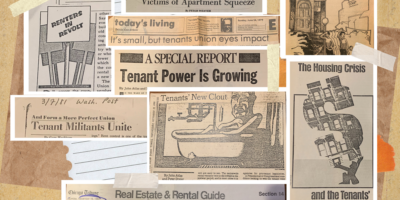A tenant union is a group of tenants from a building, block, or neighborhood that unites to struggle together against a landlord. What’s the problem with landlords?There is a fundamental material difference between a landlord, someone who owns property and infrastructure and a tenant, someone who rents from that owner, especially when it comes to housing. Housing is a basic human need- it should be a right- but in our society with rising rents, evictions, and rampant homelessness, it is treated like a luxury. Landlords make a profit off the backs their working tenants only because they were able to have the wealth to purchase the property- this speaks to the idea of generational wealth and the perpetuation of wealth inequity because the groups of people who have always had wealth and resources, continue to benefit from it no matter what laws or policies are enacted to alleviate these foundational inequities. Tenant unions are a collective formation that is meant to redistribute the power imbalance that exists between landlords and tenants because even though this hierarchy exists to keep the power at the top (landlords), there is power in the collectivization of those that are situated at the bottom of the social hierarchy (tenants).
According to the Metropolitan Council on Housing, “When tenants work together, they can apply more pressure to make a landlord provide services, make repairs, stop harassment, and get the best possible home for the rent they’re paying. A strong tenants’ association can force a landlord to listen. As a group, the tenants can have more leverage to negotiate, file complaints with the city and state agencies that oversee housing, get help from elected officials, go to court, or call a rent strike.” Tenant unions are a tried and true method to build power in your community to create better housing conditions. Great, so how do we start one? When I was doin research I found some existing neighborhood-based tenant unions in Brooklyn where I live. They had some resources that could help anyone who was interested in starting one in their building.
Ultimately, the power of a tenant union comes through coordinated, collective action. So the first step is getting to know your neighbors, having conversations, and building community. One of the traditional and effective ways to do this is through door-knocking or holding social events. You can also call a meeting of your building to talk about the issues- you are within your legal right to use building space like a lobby or courtyard to hold a meeting. Your aim is to build connections and to get to a mutual understanding about building issues. I decided to focus on tenant unions because it addresses the social justice issue of housing, as well as provides a bottom-up, community-centered solution which aligns with my own personal values and ethics. Once your building is organized, you can help organize your block then your neighborhood! You can protect you and your neighbors and your neighborhood from predatory developers that drive up rent, increase evictions, empty apartments, and gentrification! Solidarity is our most powerful weapon. Below, I will add some resources to help you to move toward attaining more knowledge about your building, your rights as a tenant, and some organizing tools to help you to move toward collective power in your building.
Resources to help you get started:
Organizing tools (a reason to knock on someone’s door/initiate a conversation)
Inspection checklist you could use this to have your neighbors check their own units and come back to report their findings at a planned tenant meeting.
Research your Landlord
Emergency Rent Assistance
Emergency rent assistance and vouchers
Housing Court Answers Hotline: 212-962-4795
Request for Rent History
Request your rent history from New York State, and/or submit questions regarding any potentially rent stabilized properties here.
Am I Rent Stabilized?
“Am I Rent Stabilized?” is a site that checks your building’s address and sees if it matches a list of properties that are likely to have rent stabilized apartments. However, it is not 100% accurate so the best course of action is always to request your rent history.






